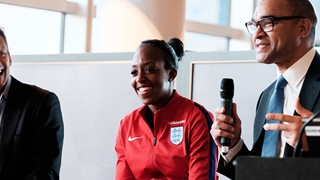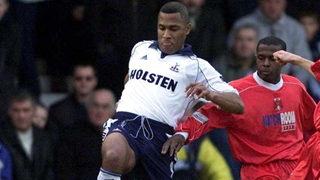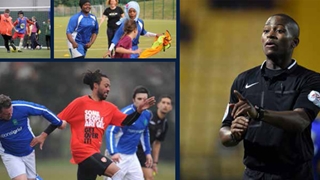
The 2013-17 Inclusion and Anti-Discrimination Plan helped create the platform from which the inclusion approach in football continues to be developed.
The plan was a joint programme devised by stakeholders across football. Its aim was to ensure that everyone had the chance to be actively involved in football, with no barriers to involvement or development in a safe, fun and friendly environment.
Like all long-terms plans, it evolved over time, with the Inclusion Advisory Board providing checks and balances for inclusion work. There is work to do to build on the outcomes of the initial plan, but it laid the foundations for The FA’s 2018-21 plan 'In Pursuit of Progress'.
The 2013-17 plan consisted of four goals:
GOAL 1: WIDEN FOOTBALL’S TALENT POOL
A wide ranging set of programmes aimed to ensure everyone who wanted to play football could, tackling under-representation and so increasing the diversity of football’s talent pool.
Following the plan, The FA introduced an Inclusion Advisory Board in 2013 which has helped lead our inclusion work since. Inclusion monitoring tools were also developed and used across The FA, CFAs, Board and Council. We continue to use them to monitor the make-up of people across football. Inclusion Advisory Groups were developed in all CFAs and The FA put in place specific interventions to improve diversity in a number of areas from apprenticeship and mentoring programmes, to bursaries for BAME programmes and the Asian Football Action Plan.
Areas of the original plan that need further attention relate specifically to diversity targets across the game; specifically The FA needs to improve data collection to ensure that The FA understands its playing population. This has been reflected in the 2018-2021 plan which sees specific emphasis on improving data collection and specific targets across the grassroots game.
GOAL 2: CLARIFY ANTI-DISCRIMINATION REGULATIONS AND SANCTIONS
To create clarity and understanding around the regulations and sanctions related to discriminatory behaviour.
As part of the plan, we wanted to ensure that the regulations were clear and the sanctions for discriminatory behaviour in both the grassroots and professional game were understood. As part of the plan we reviewed our processes and sanctions.
The IAD plan has been instrumental in setting a platform for regulations and sanctions for discrimination. A minimum five match ban for all forms of discrimination was put in place alongside a mandatory education programme for those banned for discrimination offences. The FA also reinforced its rules in relation to clubs where repeat offences had taken place and new rules were put in place by the professional Leagues too. A new reporting system was put in place with KIO which continues to be the definitive complaints procedure across the game.
GOAL 3: INSTILL CONFIDENCE IN REPORTING DISCRIMINATION
To generate confidence in the reporting and subsequent handling of discrimination cases and be transparent with the outcomes.
We wanted to improve both the options for reporting and people’s understanding of how to report. We also looked to ensure that people could have confidence that any report would be looked into thoroughly and that the outcomes to cases would be transparent.
The football bodies improved awareness through videos, films and campaigns with the Leagues, LMA and PFA all imbedding reporting protocols in their work. The PFA also set up a counselling helpline, while referees received support through PGMOL. An annual report is produced every season on discrimination in the game by KIO to ensure we continue to monitor the reporting of discrimination and make it as easy as possible to report discrimination. The plan also led to the creation of a new process for hearing discrimination cases across the grassroots alongside new guidance for grassroots clubs.
GOAL 4: INCREASE KNOWLEDGE AND AWARENESS
To increase understanding of equality and inclusion – and what constitutes discriminatory behaviour within football, providing information, guidance and training.
We wanted to ensure those playing and watching football understood equality and inclusion and what constitutes discriminatory behaviour within football. We set out programmes to provide information, guidance and training.
Support and training across the game continues with ongoing inclusion, diversity and equality training for all FA staff, CFA CEOs, Board members and the Council. The FA also reviewed and continues to review content in FA education programmes and qualifications across the game.
Referees also received training through PGMOL, managers support through the LMA and players through the Leagues. New training tools were created for stewards too, which is now being updated again by the Leagues.









